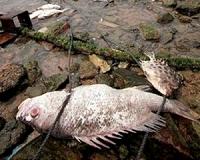| . |  |
. |
Paris (AFP) July 13, 2010 The Gulf of Mexico oil disaster is likely to cost far more than cleanup and compensation for lost income once damage to ecosystems is factored in, a top expert said Tuesday. In an interview coinciding with a UN-sponsored report on the link between business and biodiversity, economist Pavan Sukhdev said the BP debacle underscores the need for a sea change in how the "natural capital" upon which human wellbeing depends is measured and valued. "The economic invisibility of ecosystem services and biodiversity -- clean air, fresh water, healthy oceans, fertile soil, stable climates -- must be addressed with urgency," he said from London by phone. "We have to move into a society where both public and private wealth are recognized as important. But today, how many people understand 'natural capital' as compared to financial capital?" Part of the problem is not knowing how to quantify things that have long been assumed to exist in unlimited quantities. "We cannot manage what we do not measure, and we are not measuring either the value of nature's benefits or the costs of their loss," said Sukhdev, lead author of the Economics of Ecosystems and Biodiversity (TEEB) for Business report. A growing number of CEOs understand that they can no longer take for granted these "free" services, he said. But industrialisation and a global population headed toward nine billion people by mid-century have created terrible strains. Each year, the world's 3,000 largest companies are causing 2.2 trillion dollars (1.75 trillion euros) worth of environmental damage, said Sukhdev, citing a soon-to-published companion report prepared by Britain-based consultancy TruCost. "It is not the individual CEOs or the companies that are to blame. They are following the path that was created for them, where corporations can externalise all these costs to society," he said. The BP oil spill, which has been dumping an estimated 60,000 barrels of crude into the Gulf of Mexico every day, has emerged as a case study of how not to protect nature's precious assets. Had government required a "holistic economic assessment" before drilling was allowed, the potential liability might have pushed BP to take more stringent safety measures, he argued. As things stand, "we only think about them after there is a problem, and then scurry about and chase our tails for a bit," said Sukhdev, pointing to the aftermath of the Valdez Exxon, the supertanker that fouled Alaska's once pristine Prince William Sound with some 11,000 gallons of oil. The BP gusher has been spewing an equivalent amount every four or five days since April 20, according to a US government estimate. Putting a price tag on the value of affected ecosystems also changes the estimate of losses. BP has put forward a figure of 20 billion dollars for cleanup and compensation. "But what about the cost to the economy of lost utility -- eco-tourism loss, fisheries stocks that represent future losses to industry, the inability to fish in the area," Sukhdev said. The oil could also kill hundreds of square kilometres of coastal mangrove forests that are nurseries for commercial marine species and a bulkhead against hurricane damage. Even thousands of yacht owners could have a legitimate claim. "People have invested in yatchs, including a license fee to moor it, people to caretake it. When the time comes to use or rent it, they can't -- that's lost utility. Is anyone putting a number on that?" The crisis of collapsing ecosystems will only be addressed when the value of nature's services are fully reflected in political and business decision making, Sukhdev said. "We are about half way there in terms of developing the toolkit. For people understanding that the toolkit exists and should be used, we are at three-to-five on a scale of 10," he said. "As for actual implementation -- between zero and two." The TEEB report, supported by the UN Environment Programme, was launched by the European Commission in 2007 after G8 and major emerging economies called for a global study on the economics of biodiversity. The full study will be unveiled later this year at the Convention on Biodiversity in Nagoya, Japan.
Share This Article With Planet Earth
Related Links Our Polluted World and Cleaning It Up
 Top China miner pollutes river: report
Top China miner pollutes river: reportBeijing (AFP) July 12, 2010 Pollution from a mine owned by a top gold producer has severely contaminated a river in southeastern China, leading to a massive fish kill, the government and state media said Monday. Seepage from a mining waste pond owned by the Zijinshan Copper Mine has contaminated the Ding River and a reservoir in Fujian, the province's environmental protection bureau said in a statement. The leak wa ... read more |
|
| The content herein, unless otherwise known to be public domain, are Copyright 1995-2010 - SpaceDaily. AFP and UPI Wire Stories are copyright Agence France-Presse and United Press International. ESA Portal Reports are copyright European Space Agency. All NASA sourced material is public domain. Additional copyrights may apply in whole or part to other bona fide parties. Advertising does not imply endorsement,agreement or approval of any opinions, statements or information provided by SpaceDaily on any Web page published or hosted by SpaceDaily. Privacy Statement |